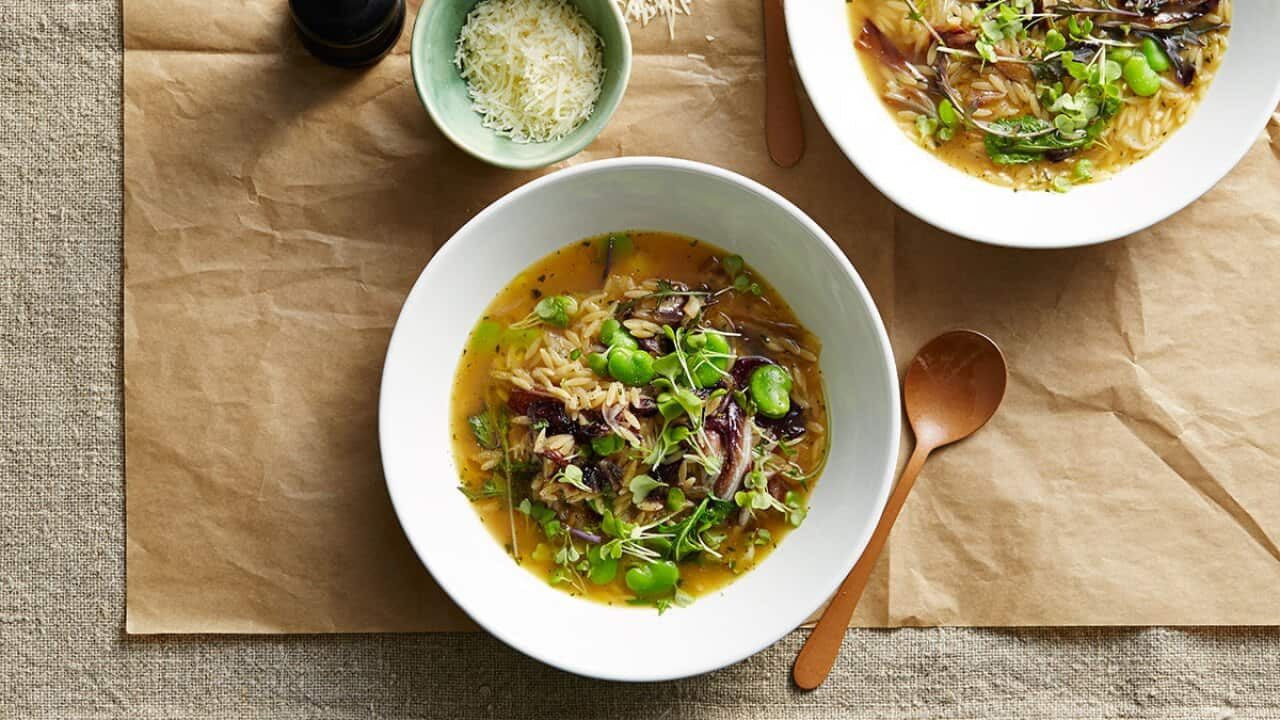“May I order the basbousa, please?" I said to a waitress with a bearing so majestic, every patron of this Egyptian diner knew that they ought to be waiting on her.
“No,” she said, flatly. “Not until you’ve eaten all your greens.”
I did it. I ate my spinach, and not only because it had become the thing dividing me from cake. I did it because there’s no point arguing with motherly sense.
My own mother held to this dietary approach: you can have a little of your cake if you eat your cabbage, too. Sometimes, she was swayed by fads—there was something called Pritikin, which seemed to involve joyless bread—but she never imposed them on her kids.
What she did impose was balance, which is no imposition at all.
When we were small, my mother was a curious cook. She was also fearlessly social and when she smelled something good coming from Shivani’s kitchen, she would march over there in her apron and say, “Woman, what is that?!” (It is with thanks not only to Shivani and the great cuisine of India that I tasted chana masala as a girl, but also my mother’s blunt refusal to leave the local supermarket until she was satisfied that they’d ordered chickpeas, then uncommon.)
Nutrition is a young science ... like all sciences, this one can be twisted by business.
My mother’s mother and her grandmother had stuck to Irish-style cooking. We didn’t eat those recipes every day. We did consume their tradition of balance. The scales of my foremother cooks always tipped toward vegetables. But otherwise, the guidelines were: a little of this, a little of that, fish on Fridays, lollies once a week.
These principles of balance, of neither over-indulging nor failing to indulge when you could, have been common to so many families and communities across the planet. Not all old habits are good. This one is.
Cooks have been mixing it up for millennia. Nutrition is a young science; as food journalist Michael Pollan has it, “kind of where surgery was in 1650—really interesting, but do you want to participate directly?”
Like all sciences, this will evolve. Like all sciences, this one can be twisted by business. Some have made a good meal out of promising science-y things on book covers and packages: fat-free, Paleo, and, ugh, “superfood”.
To propose that a particular food is a turbo-charged vehicle to good health is to propose that food is magic.
To propose that a particular food is a turbo-charged vehicle to good health is to propose that food is magic. Throwing a few science-y terms like “phytochemicals” or “immune system” around with the cacao powder is a magic trick. Food, as we know, can feel magical—I once cried ecstatic tears into a bowl of a very expensive soup. But food is not magic. It is the stuff of everyday life.
This is not to say, “listen to mum, not science.” It is to say that goji berries cost a heck of a lot and taste like a cranberry would if it were in a rotten mood. If we’re convinced our vitamin C is lacking, we could avoid scurvy by eating as many people have: seasonally, affordably and evenly.
It might be true that superfood kale has more whatsit nutrient in it than the spinach I ate in the diner. It’s also true that it has the texture and taste of old sandals. It is routinely sold at a high cost and if you must eat it, and you wouldn’t rather a nice big bowl of lettuce, grow it. Tuscan kale (or cavolo nero, the Italian name it goes by)—actually great in minestrone—grows like a weed. As does the magic language of science-y rot.
Have your semolina cake, made with butter and flour and sugar. Just make sure to eat your cabbage too.
Helen Razer is your frugal food enthusiast, guiding you to the good eats, minus the pretension and price tag in her weekly Friday column, Cheap Tart. Don't miss her next instalment, follow her on Twitter @HelenRazer.
Share
SBS Food is a 24/7 foodie channel for all Australians, with a focus on simple, authentic and everyday food inspiration from cultures everywhere. NSW stream only. Read more about SBS Food
Have a story or comment? Contact Us




